My apartment is located on one of the main thoroughfares (read: small cobblestone street) connecting the La Latina metro station to the Plaza de Cascorro, where on Sunday Madrid’s largest open air market, the Rastro, takes place. This location is, to put it lightly, on the louder side. Yesterday morning was no exception: at approximately 11:30am a marching band came down the street, pounding drums and blowing whistles. Luckily, the day before I had met with an old professor of mine who, during our meeting, told me about the Entierro de la sardina, a ceremony celebrated on Ash Wednesday. The event, culminating the end of carnaval, is a symbolic burial of the past. In its essence, the entierro consists of a parade parodying a funeral procession and concludes with the burning of a symbolic figure. So, the commotion outside my window was nothing more than a parade for the effigy of a sardine. Standard.
Later in the evening I planned to attend El destierro de la vecina, a satirical take on this parodical tradition (layers of cultural references, now that’s the stuff!)
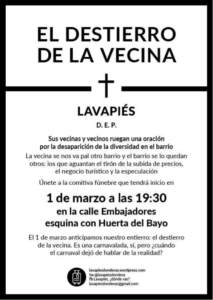
At 7:30pm I found myself sitting on a bench with two friends outside of Banco Expropiado La Canica, a vacant branch of Bankia (bailed out in 2012 by the Spanish state) that has since been occupied by neighborhood activists.
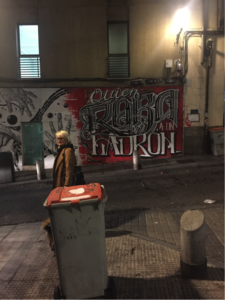
The event began with some men and women dressed in black singing a song similar to a chirigota, satirical folk songs popularized during Carnaval in Cádiz. From there the group began to march through the street with a makeshift coffin representing the dearly departed neighbor who had to leave Lavapiés due to rising prices and real estate speculation.
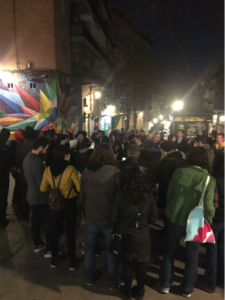
The procession itself was, like the cardboard coffin, a bit haphazard but gathered an ample crowd as the group wound its way through the neighborhood, stopping at plazas and on street corners to hand out slips of paper that described the procession, or lyrics of other parodical songs for the public to sing.
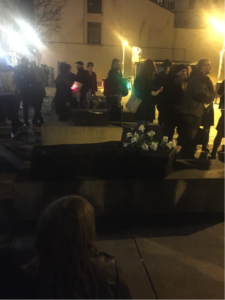
The autogestionado alternative to established events grounded in religious tradition is a trend that I’ve seen in neighborhood activism related to Lavapiés. In the summer, as a response to the Fiestas de San Cayetano—which, aside from the religious processions tend to resemble a town carnival—community members organized the Fiestas Populares de Lavapiés. On the event’s website they establish the principles of these alternate celebrations:
“Fiestas sostenibles y agradables, donde las propias fiestas sean compatibles con la habitabilidad del barrio. Apostamos por una dispersión de la actividad cultural/musical en distintos lugares del barrio y con escenarios más pequeños y con menos potencia. Queremos ampliar la actividad festiva a diferentes rincones del barrio, que música, bailes, juegos tomen las calles de manera respetuosa.”
The markers of these events are clear—celebrations for and by the people, where capital gain is not the primary motive. Neighborhood activism, a history of okupas, and a very public dialogue about gentrification, capitalism, and alternatives to the neoliberal economy contribute to this climate of resistance in Lavapiés.
While my friends and I continued to walk alongside the group, we got into a debate about what has more detrimental effects on a neighborhood’s low income residents—corporate supermarket chains, or niche local commerce, like stores that exclusively sell flower seeds. This culminated in a conversation concerning the pros and cons of commercialization in both the long and short term. Ultimately, the evening led to many questions, and a newfound respect for this woman with an orange Mohawk and funeral veil.
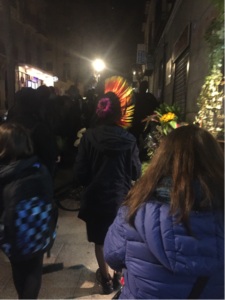
Some interesting links:
http://fiestaspopulareslavapies.es/
http://lacanica.org/2016/10/12/que-es-el-banco-expropiado-la-canica/
https://lavapiesdondevas.wordpress.com/
Bienvenido Mister Pasta (lyrics provided to atendees of the event):
Los guiris han venío ole salero con sus maletas
y a los caseros listos van a entregarles muchas pesetas
muchas divisas, vulgo parneses, de las de antes,
que ahora les llaman euros o acciones los muy tunantes
Lavapiesinas
nos despedimos sin alegría
se queda el barrio
sin la vecina que aquí vivía
ole fincasa, ole aloja
ole donpiso, ole infocasa
pal otro barrio
nos echan los desterradoes
como inversiones
camuflan especulaciones
vacían las casas y las entragan a erbienbí
levantan hoteles que son la envidia de villar mir (villa del miiir)
los fondos buitre hacen negocios…con pedrigrí
y la vivienda donde vivías ya no es pa ti (y no es pa mí)
